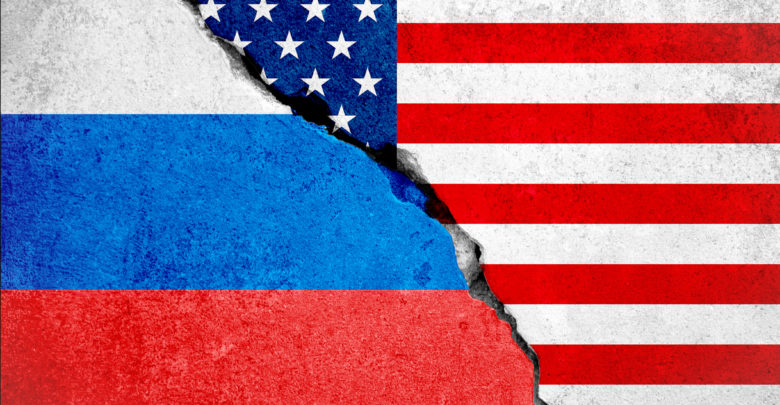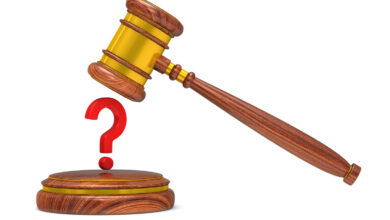Trump’s Weak “Tough on Russia” Counterpunch

Donald Trump’s “nobody’s been tougher on Russia” routine is not just a lie, it’s a weak rhetorical counterpunch against the truthful accusation that he has greatly advanced Vladimir Putin’s geo-political agenda.
Despite never having shown any evidence of physical courage, Trump has always postured himself as an “outer-borough counterpuncher.” Actually, “debate-club counterpuncher” would be closer to the truth.
Trump’s counterpunches are purely rhetorical, often amounting to no more than name-calling. Point out his childish unpresidential behavior and he’ll tell you that he could be the most presidential president ever. Comment on his ignorance about the Middle East and he’ll counter with “I know more about ISIS than the generals do.” Shine a light on his shady financial dealings and he’ll tell you that Hillary Clinton is the criminal.
And so it is with Russia. Trump counters reporting of his inexplicable advancement of core Russian interests with the opposite, no matter how ludicrous it is: “There’s never been a president as tough on Russia as I have been.”
Before you jump all over me, let me explain the “inexplicable” part.
Trump’s advancement of Russian interests is inexplicable not because there are no plausible explanations, but because there are so many.
Some believe that Vladimir Putin has turned Trump into a Russian asset by blackmailing him with kompromat. Others believe the answer lies in Trump’s affinity for autocrats and strongmen, and his pathetic yearning to be accepted as one of them. Some argue that Trump is so intellectually benighted that he just doesn’t understand the meaning, historical context, or consequences of his actions. And some say it’s all about money.
There are just too many “obvious” answers here.
It’s like the Kennedy assassination. Start with a bias, do some selective internet “research,” and you can prove that Kennedy was killed by the Russians. Or by the CIA. Or by the Mob. Or by Lee Harvey Oswald. Take your pick.
So I’m not going to pretend that I know why Trump is so relentlessly advancing Russian interests. That would require information I don’t have, so I’ll leave it to journalists, historians and prosecutors to sort it all out, hopefully soon.
Instead, I’ll focus on what he’s doing.
The “tough on Russia” narrative is a propaganda campaign.
It’s not real. It’s designed to provide Trump with a talking point to shield him from what he calls “the whole Trump/Russia thing.” Talk up the insignificant tactical “anti-Russia” actions and ignore the advancement of Russia’s core global interests. Pretend that this disproves the “Trump/Russia thing.”
In real life, the anti-Russian actions Trump has taken (or gone along with) are mostly modest responses to serious Russian provocations, and most are either cosmetic, tactical or transactional in nature.
Trump’s “tough on Russia” talking points include imposition of sanctions, expulsion of Russian diplomats, approval of the sale of military weapons to Ukraine, military strikes in Syria, and enhancement of America’s military capabilities.
None of this has diminished Russia’s long-term global interests.
Sanctions can be painful, but they are only money. Putin may be the richest man in the world. Sanctions aren’t going to change that, and Putin isn’t likely to worry excessively about some temporary monetary inconvenience for his oligarch friends or some short-term suffering for the Russian people.
And they’re not “Trump sanctions” anyway. He had to be dragged kicking and screaming into accepting them before he started taking credit for them. Even now, he is reversing sanctions against companies owned by one of Putin’s favorite oligarchs, Oleg Deripaska, without offering any rational explanation.
The expulsion of 60 Russian diplomats is also insiginificant in the larger scheme of things. It was just another two-step in the never-ending kabuki dance that amuses the diplomatic world from time to time. No serious interests are advanced or diminished by it. It’s always reciprocal, and nobody wins or loses anything important.
The approval of the sale of “lethal weapons” (as opposed to “non-lethal” weapons, I suppose, whatever they might be) to Ukraine was approved by Trump only reluctantly, after his cabinet and military advisors insisted that he do something to show disapproval of Putin’s annexation of Crimea and invasion of eastern Ukraine.
This reluctant action was no more than the minimum that would be expected of any president in response to Putin’s obscene assault on world order. Natasha Bertrand’s Atlantic article, “Ukraine’s Successful Courtship of Trump,” quotes Daniel Vajdich, a defender of Trump’s Russia policy, putting this action in its proper context: “[Trump’s] cabinet was pushing for this, and it was something that allowed him to counter this narrative that he is in bed with the Russians.”
The military actions cited in support of Trump’s “tough on Russia” narrative were also unexceptional. In one, the U.S. joined the United Kingdom and France in a limited missile strike on three Syrian locations believed to be connected to Bashar al-Assad’s chemical weapons operation. In the other, U.S. troops bombed Syrian forces backed by Russian mercenaries and military contractors in response to a surprise attack on a U.S. base.
All military strikes are serious, but both of these actions were predictable, proportionate one-off responses to direct provocations. Neither changed the course of the Syrian war, and neither caused any long-term harm to Russia’s interests in the region. Trump’s recent announcement that he intends to leave Syria to the tender mercies of Russia and Turkey further diminishes any significance these strikes may have had.
Of all of Trump’s supposedly anti-Russia actions, only the updating of our nuclear arsenal, the enhancement of missile defense systems, and our increased military buildup have any potentially long-term strategic meaning to Russia.
But let’s get real. Most of this is aimed at Iran, North Korea and asymmetrical threats from non-state actors, not the strategic balance of power between the U.S. and Russia. Both Russia and the United States already have more than enough military might to fight proxy wars in the Middle East, and neither is about to launch a ground war against the other. Their existing nuclear arsenals already make a first strike by either side unthinkable.
So while it’s fair to say that the military buildup is something real in the “tough on Russia” narrative, let’s not make too much of it.
If you want to see what “tough on Russia” really looks like, take a look at how JFK confronted a Russian nuclear threat by blockading Cuba. Or Ronald Reagan’s takedown of the Soviet Union’s “evil empire.”
That’s not to say that Trump’s actions against Russia amount to nothing. They have inflicted some pain, including harm to Russia’s economy. Trump’s supporters undoubtedly could talk up their significance. Given his druthers, and viewing these actions in a vacuum, Vladimir Putin certainly would have preferred to have avoided them.
But viewed as the price of admission for the immense geo-political advantages Trump has handed him, it’s the bargain of the century.
Since he took office, Putin has single-mindedly pursued a dream of re-establishing Russian world influence by driving a wedge between NATO allies, destabilizing western democracies, diminishing America’s reputation and role as a world leader, and sowing chaos in the American government.
Trump has given Putin all of that, and more, at virtually no cost.
Putin will trade minor tactical setbacks in exchange for world-changing strategic advances all day long, every day.





As usual, you provide reasoned explanations and examples. However, there is one overriding omission that actually is not exclusively pertinent to how dangerous this president is. The omission is simple too–easily overlooked but easily discovered: every president in modern times–and you can take that as far back as you wish–has lied about important issues countless times to both Americans and internationals. Deception for national security purposes I understand. President Trump though is just a congenital liar.
Only in President Trump’s exponential and astoundingly transparent use of lies, half-truths, obfuscation, avoidance, etc. does he differ from any other president to date. Inscrutably, Americans do not seem to care much even when Mr. Trump’s lies are so easily recognized by the simplest of our citizens.
At least when other presidents lied they did so mostly sub rosa, notwithstanding the unconscionable 1940s’ and 1950s’ lies regarding the effects of nuclear radiation; that was one durable, continuous whopper. Remember “duck and cover?” Our highest officials knew exactly the dangers of radiation, but our people generally trusted presidents implicitly, until the 1960s, of course.
Thus, only the clumsy nature of Mr. Trump’s lies surprises me. I would have expected any president to do a much better job of lying
Yep. Trump is unique in not only clumsy nature and volume, but also, as you point out, how transparent his lies are. Actually, I doubt he thinks about truth one way or another. If he thinks it will help him, he’ll say it. He knows many will believe him, and it’s the believing that counts to him, not the truth or falsity.